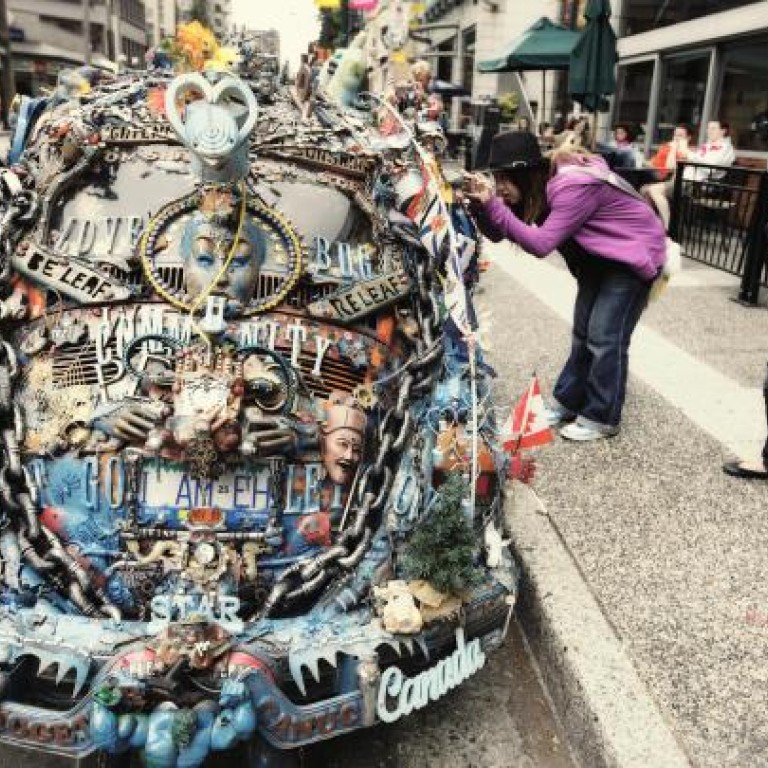
Fears rise in Vancouver's Chinatown as trendy businesses move in
Historic Vancouver quarter has drawn hip business owners, a trend some fear will push up home prices and price out the poor
A new wave of immigration is raising tensions in Vancouver's historic Chinatown, with some fearing that the influx will overwhelm the district's low-income residents.
But unlike elsewhere in the city, where wealthy mainland Chinese are often blamed for driving up property prices, Chinatown's interlopers are trendy young locals, who have brought a wave of new businesses to the rundown area in the past 18 months.
These include a skateboard shop, a motorcycle-themed cafe, art galleries, boutiques and a sausage-and-beer deli. While the Chinatown business community has generally welcomed the newcomers for reducing vacancy rates and revitalising the district - infamous for drugs, homelessness and street prostitution - advocates for the low-income residents who have lived there for decades see them as the first wave of an invasion.
"Speculators and developers see the Downtown Eastside and Chinatown as prime targets … to buy low and sell high," said Ivan Drury, a prominent community organiser for the city's poor, who predicts that the "cultural gentrification" of the neighbourhood is precursor to a residential push that would leave the poor with nowhere to go. "There's a great deal of money to be made."

Nightly pickets have been staged outside the stylish Pidgin restaurant, which takes its name from the neighbouring Pigeon Park, a homeless hangout notorious for drug-dealing.
Two weeks ago, self-proclaimed anarchists stole a sign from nearby Save-On-Meats, a restaurant-cum-butcher's shop that has been turned into another favourite hipster hangout.
The balaclava-clad thieves posted a photo of themselves with the sign on an anarchist website, along with an anti- gentrification manifesto that said they were fighting an "ongoing movement to displace the existing residents" that was embodied by Save-On's trendy transformation.
Drury, who works at the Carnegie Community Action Project, said such shops were legitimate targets for protest. "It's irresponsible to have development of the economy to benefit the rich ahead of social housing and improving the economy for the existing residents," he said.
His group is critical of developers who are looking to extend Vancouver's real estate boom into its poorest suburbs. Developer Solterra was last year granted approval for a 10-storey apartment tower, the Keefer Block, saying it would be "at the epicentre of transformation and redevelopment in historic Chinatown".
Prices are slated to start from about C$250,000 (HK$1.9 million) for a one-bedroom, 450 sq ft condominium - cheap by Vancouver standards, but unattainable for most of the current residents of Chinatown, where the median annual household income is about C$17,700.
The project, currently under construction, will stand out among the grim "single-room occupancy" (SRO) hotels that provide the bulk of the accommodation in the district. Many long-time residents are elderly single Chinese, with Chinatown's population about twice as likely to be aged over 65 as the rest of Vancouver's, the 2011 census shows.
The changing demographics in the district can be jarring. Bearded young men in skinny jeans weave their bicycles around hunched Chinese women dragging shopping carts, and the smells of dried seafood and herbal medicine mingle with the aroma of freshly ground coffee.
But Henry Tom, chairman of the Vancouver Chinatown Revitalisation Committee, said he welcomed the newcomers. "They have become quite involved in the community and are very respectful," he said. "[But] I hope Chinatown can retain its character and heritage. I personally welcome these new businesses, but a lot of work still needs to be done to attract more outwardly Chinese businesses."
Rather than driving out the Chinese community, Tom said the new businesses could help attract Chinese firms, which had shunned the district in recent decades due to its seedy reputation. Consequently, commercial rent in Chinatown was the cheapest in the city, said broker Jordan Eng, who recently told newspaper that at C$15 to C$30 per sq ft per month, Chinatown's rates were about a tenth of the cost of renting two kilometres away on Robson Street, Vancouver's premier shopping district.
"Chinese businesspeople are very conservative," said Tom. "But these young people, they are attracted by the low rent. They are risk-takers, and they have the pioneering spirit."
Tom said he was optimistic that the need for low-income housing could be reconciled with Chinatown's rejuvenation. He said the Chinese benevolent societies that run about half of the SRO hotels there stayed committed to their role of housing the elderly and poor. "Over the past two centuries it [Chinatown] has been an inclusive neighbourhood, with a mix of high- and low-income people and businesses. I believe there is room for everybody," Tom said.

